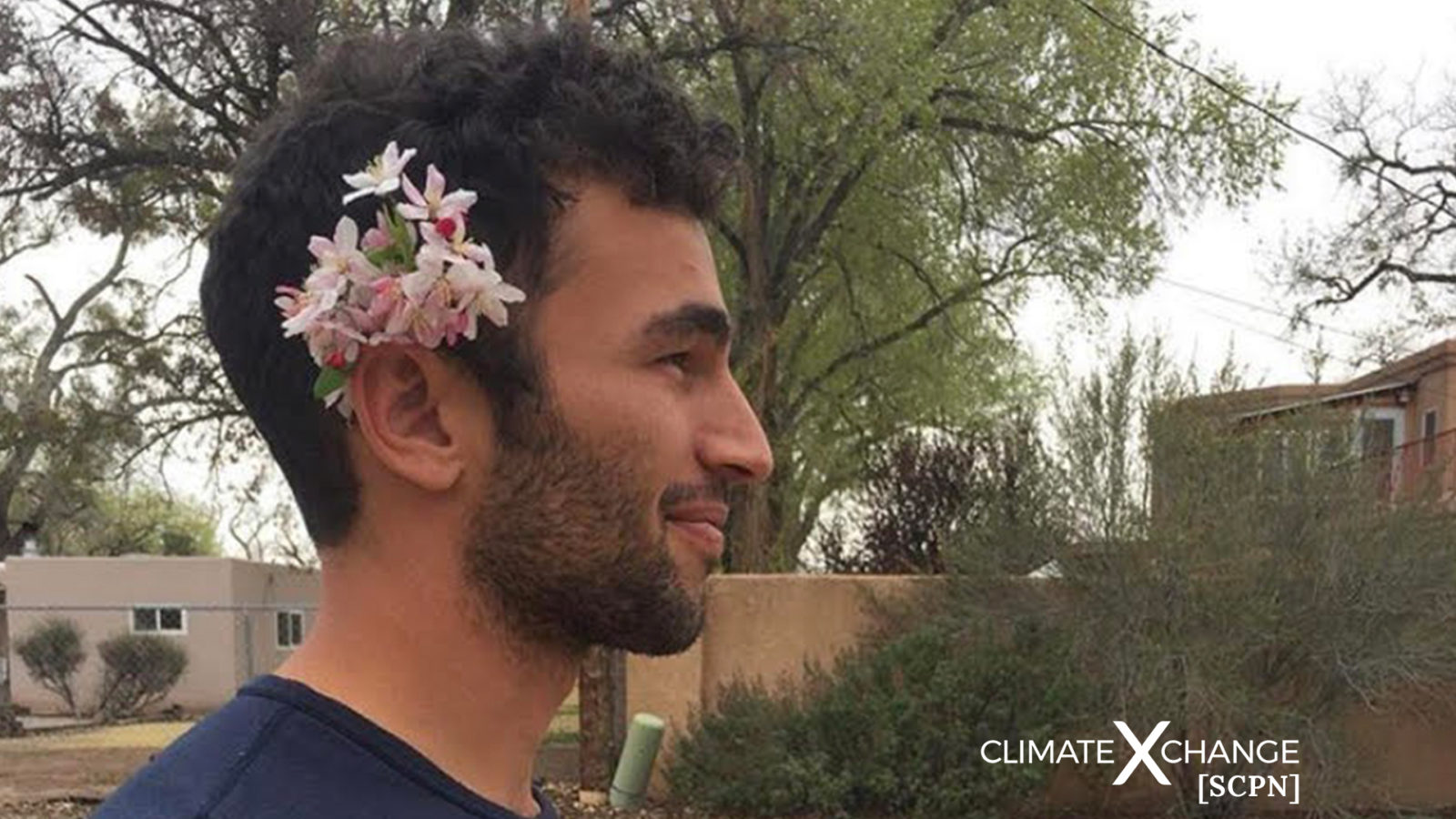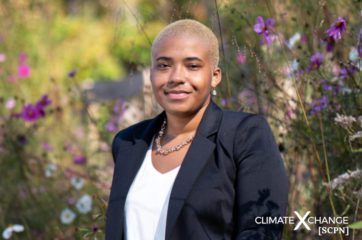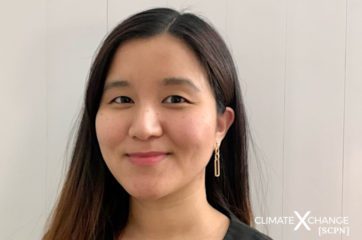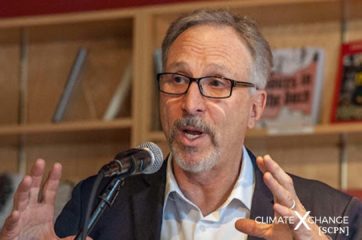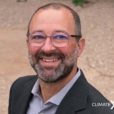All across the country, members of our State Climate Policy Network (SCPN) are fighting to make an impact on climate change in their communities. We have individuals in our Network from all 50 states, each experiencing climate change differently in their local areas and finding unique solutions to build resiliency efforts.
Saba Ijadi is the Climate Justice Coordinator at the Fairmount-Indigo CDC Collaborative, a group of community development corporations serving the predominantly low- and moderate-income neighborhoods along the Fairmount Commuter Rail Line from Hyde Park to North Dorchester in Boston. His work focuses on the intersection of climate change and public health and the direct impacts that climate change has on the communities he serves.
Ava Gallo
Thank you so much for taking the time to have this Spotlight interview today. I’m excited to learn more about your work! Let’s start off with going into your background.
Saba Ijadi
Sure. I am originally from Albuquerque, New Mexico, and I spent a lot of time hiking around the Rio Grande. My connection to environmental policy and climate justice goes back to my undergrad where I studied political science. I started off very idealistic as a young undergraduate wanting to study philosophy and thinking that I was going to start a revolution.
But after graduating and taking a few environmental science and policy courses, I realized that I needed to get more specific. I read about a lot of dystopian futures and all these heavy philosophy texts. So I came to the conclusion after graduating that science is the answer, and we need to fix the environment to solve all the social justice problems in the world, too.
Then I went into graduate school to focus on science. I joined the Peace Corps in the Philippines where I studied marine conservation and fisheries management. There I got really into conservation, but recently have gone back to my roots. We need to solve these social justice issues before we can even tackle the environmental justice issues.
Now I’ve landed on climate justice in Boston, because I wasn’t being fulfilled by focusing on the life cycle of a certain species of fish or in my previous position focusing on solid waste management in communities across the state of New Mexico. I wanted something more, because I was seeing all of these connections between social justice and climate change.
Ava Gallo
Thank you for that! I’d love to hear more about what led you to go into the Peace Corps and how that informs your work now.
Saba Ijadi
I went into the Peace Corps through a program that combines Peace Corps service with graduate school. I focused on coastal resource management under the environmental policy field, so the Peace Corps allowed me the opportunity to experience the theory I was learning in the field of fisheries management, coastal resource management, and marine conservation in person. And I’ve always been someone who was interested in new cultures and traveling the world. As a mid-twenties person, Peace Corps was the perfect opportunity for that.
What I loved about it and what I take moving forward in the work that I do, is the community organizing aspect of any conservation or environmental policy work. I learned in the Peace Corps that you really need to have people who have a personal connection to the work that you are doing. Working back in the U.S., I try to remember that the personal connection is the most important part of this work.
Ava Gallo
So that threads you to your work now as the Climate Justice Coordinator at the Fairmount-Indigo CDC Collaborative. Can you talk more specifically about the work that you do there and what you are most proud of having accomplished so far?
Saba Ijadi
The work that we are doing now is really focused on the connection between health and climate change. Our team has done a lot of background research on the health impacts of climate change. We’ve also done a series of climate justice round tables where we’ve spoken to residents in our neighborhoods, which are Dorchester, Hyde Park, Roslindale, Mattapan, and West Roxbury. We’ve cast a broad net in the community to see who is interested in speaking on climate justice and the intersection of health and climate change. Then we turn it around to the community members who have emerged as leaders in the space and ask how do all of these problems affect you.
Pre-Covid we were able to meet in person, but now we are doing it all digitally. We have had experts come in, and engaged with residents through open discussions, surveys, one on one interviews, and a number of different communication methods. I’ve been working on this since January, and I’m proud that we have been able to surface very critical needs in our communities that can be addressed through climate change policies and give us a guiding light forward to how we get out of this climate crisis in a way that is equitable.
Ava Gallo
Are you gathering this landscape analysis of need from these communities for the purpose of acting on climate policy? Is that the trajectory of the program?
Saba Ijadi
Yes. This first phase of the project is where we identify the most critical needs to then understand what climate policies we should pursue. Over the next 3 years, we will initiate an advocacy campaign that has deep grassroots organizing components and levels up to actual policy change at the city and state level.
Ava Gallo
That is so exciting! It is so important to tie in community engagement components to guide the priorities of an organization.
Moving to more of a larger philosophical question, how do you see racial justice and climate justice intersecting in this current moment?
Saba Ijadi
I want to give a shout out to the Sunrise Movement. In one of their newsletters they had a quote, “Climate change will be solved when we value everybody’s life equally.” I think that did a great job of summing up the idea that we cannot move forward on climate until we recognize that Black lives do matter, and we have to recognize that at all levels of policymaking.
There is this conversation starting to happen among environmental organizations addressing that there hasn’t been enough space for voices from communities of color. It’s really great that there is this reckoning, and I hope that we start to see some action come from it.
Ava Gallo
Do you have any advice for people trying to advance racial justice who work in a mainstream environmental organization or government position where that priority is not shared?
Saba Ijadi
That’s tough, because my organization is very on top of racial justice. They’ve been doing it for years in their other programs. One thing that I’ve found to be really helpful as a person of color working in an environmental organization is to connect with the other people of color in those fields.
Also, I have broadened my view of what an environmental professional is. It is not always someone in a suit that has a PhD. It’s also landscapers and fishers. Those people are also involved in this, and their voices are just as valuable. Communicating that to larger organizations that might not share those values is difficult, but something we need to keep doing.
I do think that pointing out the health impacts is always helpful, because there is a shift in the calculus once you do that. In our cost benefit analysis, are we factoring the health impact that climate change is having on people of color? You can give that a monetary value or whatever value you want, but more and more as public health gets involved in climate change, we are starting to see that shift. That is what my project is trying to do to change the calculus of climate change policies.
The last thing I’ll say, I mentioned connecting with other people of color in the environmental field. Myself and some colleagues have started a group called Professionals of Color in the Environment, POCIE. We started this loose network of folks, so if you are a person of color working in the environmental field in Massachusetts, you are welcome to come to that!
Ava Gallo
That’s so great! I will definitely make sure to share within my network.
In this moment of political turmoil and multiple crises, how do you find inspiration to continue on in this work?
Saba Ijadi
A big source of motivation for me is seeing people from different disciplines coming together to reckon with the same issues. Just the fact that as an organization primarily focusing on carbon pricing at a state level, you are even asking me this question about all these different crises, shows how far we’ve come in terms of recognizing intersectionality of issues. I love seeing that. Previously I would have felt really intimidated talking to an economist or an engineer or a doctor about climate change or racial justice, but now that door is opening more, which is really encouraging to see!
Ava Gallo
You’ve been all over the world and done work across the country. Are there other advocates or organizations whose work inspires you as you navigate your own work?
Saba Ijadi
Definitely! I will just focus on folks who I know and work with in Massachusetts. Dave Queeley at Codman Square NDC is one of the people I work with on my project. Outside of the work he does with me, he gives green infrastructure training for people in his community. He is the Director of the Eco-Innovation District at Codman Square, which is really inspiring to see!
The folks at Southwest Boston Community Development Corporation, Pat Alvarez and Perla Lara, work on youth education with their Green Team and preserving open space in the urban wilderness down there.
Those are just a few people whose work I always follow, partly because I talk to them every day for the work we do together, and partly because I admire the work they do, and it is inspiring to see them pushing forward.
Ava Gallo
So just to wrap up, do you have any words of advice to leave the readers with?
Saba Ijadi
Just stay positive! I don’t have too much advice to give, because I am still learning and seeking advice from everyone, too.
Ava Gallo
I can definitely relate to that! Thank you so much for your time, Saba.

